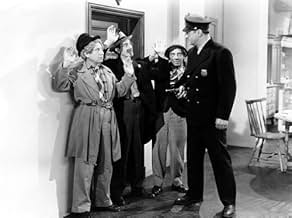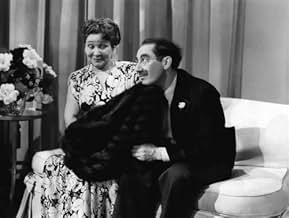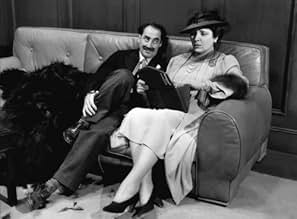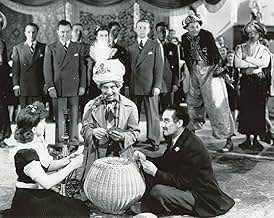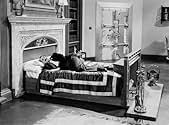AVALIAÇÃO DA IMDb
6,5/10
5,6 mil
SUA AVALIAÇÃO
Adicionar um enredo no seu idiomaA detective is hired to protect the life of a singer who has recently inherited a department store, from the store's crooked manager.A detective is hired to protect the life of a singer who has recently inherited a department store, from the store's crooked manager.A detective is hired to protect the life of a singer who has recently inherited a department store, from the store's crooked manager.
- Direção
- Roteiristas
- Artistas
King Baggot
- Store Employee
- (não creditado)
Marvin Bailey
- Member - Six Hits and a Miss
- (não creditado)
Avaliações em destaque
This latter Marx Bros. comedy still contains some vintage moments between Groucho and his longtime foil Margaret Dumont, with good comic dialogue written for Groucho once again. The scene where she visits his office to hire him as a detective, as he and Harpo pull off a ruse by making it appear that Groucho's not a starving nobody but a first-class private eye, is as good as anything I've seen in their other pictures.
Things get bogged down later with musical numbers (I mean, what else is new?), but I was impressed by many of the sets in the grand department store.
Some good, some not-so-good.
Things get bogged down later with musical numbers (I mean, what else is new?), but I was impressed by many of the sets in the grand department store.
Some good, some not-so-good.
When crooner Tommy (Tony Martin) inherits his father's lucrative department store, he hopes to sell it to open a music conservatory for disadvantaged boys. Shady store manager Mr. Grover (Douglass Dumbrille) has been embezzling from the place, so he tries to have Tommy killed before the deal can take place and reveal Grover's malfeasance. Tommy's aunt Martha (Margaret Dumont) hires private detective Wolf J. Flywheel (Groucho Marx) to be Tommy's bodyguard, and along with Flywheel's assistant Wacky (Harpo Marx) and Tommy's pal Ravelli (Chico Marx) they get into all sorts of trouble in the department store.
The Marx Brothers declared that this would be their last film together, and I can see why they wanted to give it up after this substandard outing. The jokes fall flat, and too much time is spent on other characters and Tony Martin's singing numbers. It's not a complete bust, and there are a few chuckles scattered about like rare gems. Groucho's scenes with Dumont are still funny. The Brothers eventually made a couple more together as finances necessitated it, but they never matched their early 30's heyday.
The Marx Brothers declared that this would be their last film together, and I can see why they wanted to give it up after this substandard outing. The jokes fall flat, and too much time is spent on other characters and Tony Martin's singing numbers. It's not a complete bust, and there are a few chuckles scattered about like rare gems. Groucho's scenes with Dumont are still funny. The Brothers eventually made a couple more together as finances necessitated it, but they never matched their early 30's heyday.
The Big Store is not one of the Marx Brothers' best films, but it's worth watching once. Groucho still delivers a few good one-liners and insults to Margaret Dumont. Harpo and Chico have some good scenes (watch as an Italian immigrant accuses Chico of mocking his accent!). I actually think that the musical numbers in this one are wonderful, except for those by Tony Rogers, one of the many love interest duds who grace the Brothers' flicks. Maltin's right: The Tenement Symphony is a suicide-inducing number, and easily a low point in all of the Marx Brothers' films, except for the entire running time of Love Happy. But there's a great song and dance number when Groucho first enters the store. You have to catch the woman singing a jazzed-up version of Rock-a-bye Baby; I have never seen a more eerily emotionless visage on a human being. It's creepy and oddly beautiful. Chico and Harpo perform an awesome piano duet. There's also a scene where four young kids play the piano like Chico, which is very charming. And Harpo's harp sequence is pretty good (he plays Mozart on the harp, and then his two reflections accompany him with other, various string instruments). The final chase sequence is rather annoying. The Marx Brothers' fall came about when their films started overutilizing special effects, fast motion, and sound effects to enhance the comedy. Still, The Big Store is not a disaster, by any means. 7/10.
After Zeppo Marx refused to move on with his brothers to MGM from Paramount, the Marxs usually secured the services of another player, usually a singer to function in Zeppo's nondescript place. Usually that person had a lot more personality than Zeppo did. It was Allan Jones in two films, Kenny Baker in one and in The Big Store it was Tony Martin.
The still very much alive, but retired Tony Martin, had one of the great voices of the last century. He never made the screen impact that other singers did, though he was in some very good films. His main media outlets were records, radio, and as one of the premier nightclub attractions, especially when he appeared with his second wife Cyd Charisse. Martin had two songs to sing in The Big Store, the much maligned Tenement Symphony and a really nice ballad, If It's You.
Martin is the heir to one half of Phelps Department store. The other half is owned by his aunt Margaret Dumont. The Hastings Brothers, who own a chain of department stores, are looking to buy this one.
Manager Douglass Dumbrille has been doing a little embezzling on the side and he's afraid that if Martin sells his half, he's taking a stretch up the river. After Martin becomes the victim of an attempted murder, Dumont hires who else, detective Wolf J. Flywheel who is of course Groucho Marx.
By a happy coincidence, Groucho has Harpo as a sidekick and Harpo's brother in the film Chico is a friend of Martin's. So now we have all the Marx Brothers working at the store.
The Big Store is usually dismissed as one of the Marx Brothers lesser films, but it's always been a favorite of mine. Another reviewer said there were too many musical numbers. I don't think there were any more or less than in other films of their's. The running time is a bit short so it might seem like there's more.
The highlight for me is always the final chase seen through the store, especially since Douglass Dumbrille joins in the fun. Dumbrille on screen usually plays some serious villains, probably his best known part is that of Mr. Cedar the lawyer who is milking the estate that Gary Cooper is inheriting in Mr. Deeds Goes to Town.
Dumbrille is just as successful dealing with the Marx Brothers over embezzlement as he is with Gary Cooper. But here this very serious and obviously classically trained actor joins right in the slapstick fun. Dumbrille looks like he's having a ball. Later on he would really cut loose in a couple of Abbott and Costello films.
A question to all movie fans. Who do you think had the most inventive screen character names, W.C. Fields or Groucho Marx?
The still very much alive, but retired Tony Martin, had one of the great voices of the last century. He never made the screen impact that other singers did, though he was in some very good films. His main media outlets were records, radio, and as one of the premier nightclub attractions, especially when he appeared with his second wife Cyd Charisse. Martin had two songs to sing in The Big Store, the much maligned Tenement Symphony and a really nice ballad, If It's You.
Martin is the heir to one half of Phelps Department store. The other half is owned by his aunt Margaret Dumont. The Hastings Brothers, who own a chain of department stores, are looking to buy this one.
Manager Douglass Dumbrille has been doing a little embezzling on the side and he's afraid that if Martin sells his half, he's taking a stretch up the river. After Martin becomes the victim of an attempted murder, Dumont hires who else, detective Wolf J. Flywheel who is of course Groucho Marx.
By a happy coincidence, Groucho has Harpo as a sidekick and Harpo's brother in the film Chico is a friend of Martin's. So now we have all the Marx Brothers working at the store.
The Big Store is usually dismissed as one of the Marx Brothers lesser films, but it's always been a favorite of mine. Another reviewer said there were too many musical numbers. I don't think there were any more or less than in other films of their's. The running time is a bit short so it might seem like there's more.
The highlight for me is always the final chase seen through the store, especially since Douglass Dumbrille joins in the fun. Dumbrille on screen usually plays some serious villains, probably his best known part is that of Mr. Cedar the lawyer who is milking the estate that Gary Cooper is inheriting in Mr. Deeds Goes to Town.
Dumbrille is just as successful dealing with the Marx Brothers over embezzlement as he is with Gary Cooper. But here this very serious and obviously classically trained actor joins right in the slapstick fun. Dumbrille looks like he's having a ball. Later on he would really cut loose in a couple of Abbott and Costello films.
A question to all movie fans. Who do you think had the most inventive screen character names, W.C. Fields or Groucho Marx?
While I disagree with the conventional wisdom about the Marx Brothers' film made before The Big Store, Go West (1940), believing it to be yet another one of their many masterpieces, I have to agree with the conventional wisdom about The Big Store. It has the feeling of a contractual obligation film. One, two or all three of the Marx Brothers are absent for long periods of time. The story is often confusing. The film doesn't flow very well. Some of the material featuring other performers simply doesn't work. Even when it does work, it's never as good as the Marx Brothers' material, and even their work is too often strangely flat.
The Big Store is really the story of Tommy Rogers (played by famed pop singer Tony Martin). Rogers has just gained partial ownership of the Phelps Department store with the passing of a relative. However, he's not interested in the store, so he plans to sell and use the money to build a state of the art music conservatory in conjunction with his friend, Ravelli (Chico Marx). Unfortunately, not everything at the Phelps store has been on the up and up, and surviving store manager Mr. Grover (Douglass Dumbrille) is worried about buyers discovering their creative bookkeeping. So they try to off Tommy, which leads to hiring private detective Wolf J. Flywheel (Groucho Marx) and his assistant, Wacky (Harpo Marx), who happens to be Ravelli's brother. At the same time, Mr. Grover is courting Martha Phelps (Margaret Dumont), Tommy's aunt, with machinations of eventual ownership of the store.
In terms of meatiness, that's far more of a plot than I usually relay, but all of that is presented in the first 10 - 15 minutes of the film. The remainder involves playing out those threads. The problem is that the above is way too complicated, especially for a Marx Brothers film. The Marx Brothers style was that plots were really secondary to their anarchic, madcap skits. In truth, the two were usually well integrated in their films, with meatier plots than the conventional wisdom has it, and the skits relatively seamlessly enmeshed in the plots.
Here, the plot is often difficult to follow, and when you do manage to follow it, it just isn't that interesting. Despite this, there are still a number of fabulous set pieces. The scene where we first meet Groucho and Harpo in Groucho's private eye office is hilarious. The bedding department scene is good. The climax, featuring an extended chase through the department store, is a lot of fun, including its cartoonish use of wire stunts and camera tricks.
But there just isn't enough of that stuff, and one of the Marx Brothers' strongest points--Groucho's verbal bantering, is oddly flat just as often as it isn't. Even the usual musical sequences are problematic, unlike their sublime charm in Go West. Only Harpo's musical sequence and a brief duet with Chico on the piano are worthwhile. Groucho is given a schmaltzy "big musical production number" that goes on too long, is supposed to be funny and isn't, and ends up with Groucho doing little else but mugging and doing his trademark walk while other characters we're not familiar with sing the song.
Tony Martin has a song early on in the film that's okay, but doesn't exactly fit the tone of the film, and later, he does another "big musical production number", called "The Tenement Symphony", that is bizarre, to say the least, but not particularly funny. Instead, it's a strange mish-mash of styles that is strongly derivative (in a negative way) of George Gershwin.
While Marx Brothers completest certainly can't avoid The Big Store, it's difficult to imagine this being anywhere near the top of the list for any Marx Brothers fan. It's also not a great way to introduce anyone to their work (as they're likely to not be very interested in seeing more), and there are far better films for casual viewers who are not particularly interested in the Marx Brothers.
The few hilarious scenes could easily be excised and work just as well (if not better) in isolation, as "random" skits. But the film is very slightly recommendable for them.
The Big Store is really the story of Tommy Rogers (played by famed pop singer Tony Martin). Rogers has just gained partial ownership of the Phelps Department store with the passing of a relative. However, he's not interested in the store, so he plans to sell and use the money to build a state of the art music conservatory in conjunction with his friend, Ravelli (Chico Marx). Unfortunately, not everything at the Phelps store has been on the up and up, and surviving store manager Mr. Grover (Douglass Dumbrille) is worried about buyers discovering their creative bookkeeping. So they try to off Tommy, which leads to hiring private detective Wolf J. Flywheel (Groucho Marx) and his assistant, Wacky (Harpo Marx), who happens to be Ravelli's brother. At the same time, Mr. Grover is courting Martha Phelps (Margaret Dumont), Tommy's aunt, with machinations of eventual ownership of the store.
In terms of meatiness, that's far more of a plot than I usually relay, but all of that is presented in the first 10 - 15 minutes of the film. The remainder involves playing out those threads. The problem is that the above is way too complicated, especially for a Marx Brothers film. The Marx Brothers style was that plots were really secondary to their anarchic, madcap skits. In truth, the two were usually well integrated in their films, with meatier plots than the conventional wisdom has it, and the skits relatively seamlessly enmeshed in the plots.
Here, the plot is often difficult to follow, and when you do manage to follow it, it just isn't that interesting. Despite this, there are still a number of fabulous set pieces. The scene where we first meet Groucho and Harpo in Groucho's private eye office is hilarious. The bedding department scene is good. The climax, featuring an extended chase through the department store, is a lot of fun, including its cartoonish use of wire stunts and camera tricks.
But there just isn't enough of that stuff, and one of the Marx Brothers' strongest points--Groucho's verbal bantering, is oddly flat just as often as it isn't. Even the usual musical sequences are problematic, unlike their sublime charm in Go West. Only Harpo's musical sequence and a brief duet with Chico on the piano are worthwhile. Groucho is given a schmaltzy "big musical production number" that goes on too long, is supposed to be funny and isn't, and ends up with Groucho doing little else but mugging and doing his trademark walk while other characters we're not familiar with sing the song.
Tony Martin has a song early on in the film that's okay, but doesn't exactly fit the tone of the film, and later, he does another "big musical production number", called "The Tenement Symphony", that is bizarre, to say the least, but not particularly funny. Instead, it's a strange mish-mash of styles that is strongly derivative (in a negative way) of George Gershwin.
While Marx Brothers completest certainly can't avoid The Big Store, it's difficult to imagine this being anywhere near the top of the list for any Marx Brothers fan. It's also not a great way to introduce anyone to their work (as they're likely to not be very interested in seeing more), and there are far better films for casual viewers who are not particularly interested in the Marx Brothers.
The few hilarious scenes could easily be excised and work just as well (if not better) in isolation, as "random" skits. But the film is very slightly recommendable for them.
Você sabia?
- CuriosidadesSeventh and final film teaming of The Marx Brothers with Margaret Dumont.
- Erros de gravaçãoObvious doubles for the main characters during the finale chase sequence (except for close-ups).
- Citações
Mr. Grover: What experience have you had at a department store?
Wolf J. Flywheel: I was a shoplifter for three years.
- ConexõesFeatured in Classic Comedy Teams (1986)
- Trilhas sonorasTenement Symphony
(1941)
Music by Hal Borne
Lyrics by Sid Kuller and Ray Golden
Sung by Tony Martin (uncredited) and St. Luke's Episcopal Church Choristers (uncredited),
with Chico Marx (uncredited) and Harpo Marx (uncredited)
Principais escolhas
Faça login para avaliar e ver a lista de recomendações personalizadas
- How long is The Big Store?Fornecido pela Alexa
Detalhes
- Data de lançamento
- País de origem
- Idiomas
- Também conhecido como
- A Grande Loja
- Locações de filme
- Empresa de produção
- Consulte mais créditos da empresa na IMDbPro
- Tempo de duração
- 1 h 23 min(83 min)
- Cor
- Proporção
- 1.37 : 1
Contribua para esta página
Sugerir uma alteração ou adicionar conteúdo ausente


